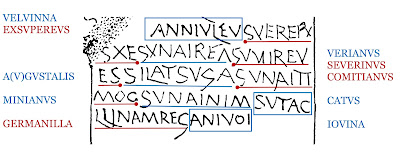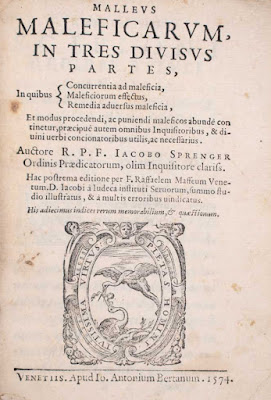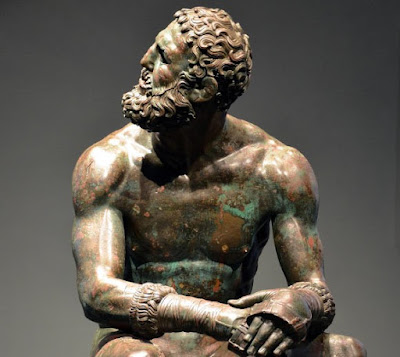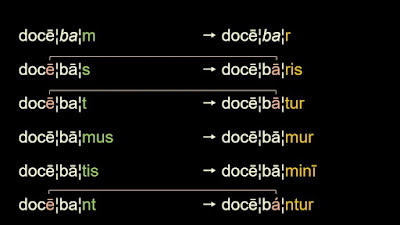Complete each Latin sentence with the words listed below.
[1] __________ [2]
__________ acadēmīam. │ The Rector
(Principal; headteacher) rules the academy.
Paedagōgus* advertit et [3] __________.
│ A pedagogue steers and pushes [a student].
Grammaticus* [4]
__________. │The grammarian speaks.
Rhētor* [5]
__________ loquitur. │ The
rhetorician speaks eloquently.
Dialecticus [6]
__________. │ A dialectician (debater; somebody
who argues using logic) disputes (argues).
Vēra ā falsīs [7] __________. │He discerns
truth (true things) from falsehood (false things).
Mūsicus [8] __________. │ The
musician sings (plays music).
Poēta carmina [9] __________.
│ A poet makes poems (fashions them)
[10] __________ effigiem vel imāginem [11] __________.
│ A painter paints a picture or an image.
Historicus rēs gestās [12] __________.
│ An historian narrates deeds.
Astronomus [13] __________
astra. │ An astronomer describes the stars.
Physicus nātūram [14] __________. │ A
scientist investigates nature.
Medicus eam [15] __________. │ A physican (doctor)
imitates it.
Ēthicus trādit [16] __________, │ An ethicist
teaches rules (has a wider meaning of customs)
cantat; dēscrībit; discernit; disputat; fingit; imitātur; loquitur; mōrēs;
nārrat; ōrnātē;
pictor; pingit; rēctor; regit; scrūtātur; urget
* There are three terms
used in the sentences above that relate directly to education in Ancient Rome.
The well-to-do wished their sons to enter the world of politics for which
public speaking was an essential skill. They studied Latin, Greek and Rhetoric.
rhētor, rhētōris [3/m]: teacher of
rhetoric
grammaticus, -ī [2/m]: (secondary)
teacher of Latin or Greek
paedagōgus, -ī [2/m]: (Ancient Rome)
educated slaves, usually Greek, who taught Roman children
____________________
Rēctor regit acadēmīam. │ The Rector
(Principal; headteacher) rules the academy.
Paedagōgus advertit et urget.
│ A pedagogue steers and pushes [a student].
Grammaticus loquitur. │The grammarian speaks.
Rhētor ōrnātē
loquitur. │ The rhetorician speaks eloquently.
Dialecticus disputat. │ A dialectician disputes (argues).
Vēra ā falsīs discernit. │He discerns
truth (true things) from falsehood (false things).
Mūsicus cantat. │ The musician
sings (plays music).
Poēta carmina fingit. │ A poet
makes poems (fashions them)
Pictor effigiem vel imāginem pingit. │ A painter
paints a picture or an image.
Historicus rēs gestās nārrat.
│ An historian narrates deeds.
Astronomus dēscrībit astra. │
An astronomer describes the stars.
Physicus nātūram scrūtātur. │ A scientist investigates
nature.
Medicus eam imitātur. │ A physican (doctor)
imitates it.
Ēthicus trādit mōrēs, │ An ethicist teaches
rules (has a wider meaning of customs)









































.jpg)
_text.jpg)

